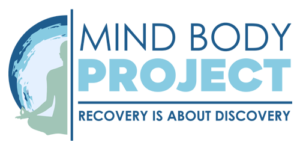YOGA
Yoga and recovery
one of the keystones of the Mind Body Project
Yoga can be a powerful tool to aid in recovery from substance abuse. The Mind Body Project, a non-profit organization dedicated to empowering individuals impacted by addiction and mental health challenges, provides yoga classes as part of their substance abuse treatment program. Through yoga, participants learn to relax the body and calm the mind, which helps them better cope with stressors that may arise during the recovery process. These classes also provide an opportunity to build strength, which helps promote physical and mental health.
The Mind Body Project emphasizes the importance of addressing both substance abuse and mental health issues as part of a successful recovery process. Through its yoga program, participants have access to professionals trained in understanding addiction and mental health challenges within a safe, supportive environment. This enables individuals to practice self-care and to develop skills that can be used for long-term sobriety. Participants also gain a sense of community, which is often key in the recovery process.

What are some ways yoga with Mind Body Process can help aid in recovery?
 Stress Reduction:
Stress Reduction:
Yoga helps manage and reduce stress by regulating stress hormones, like adrenaline and cortisol.
This ability to decrease stress levels can be crucial in maintaining sobriety. Additionally, yoga promotes mindfulness, which can assist individuals in recognizing and addressing emotional triggers that could lead to relapse.
 Increase in Physical Fitness:
Increase in Physical Fitness:
Yoga practices include various asanas or postures that can enhance muscle strength, flexibility, and overall fitness, aiding in overall physical health.
Additionally, this improved physical condition can also boost an individual’s overall emotional and mental health.
 Improved Mental Health:
Improved Mental Health:
Yoga is widely known to have positive effects on mental health.
Studies have found that regular yoga practice can improve mood, reduce anxiety, and help with depression. These benefits of yoga are especially important for individuals in recovery from substance abuse
 Enhancement of Mindfulness:
Enhancement of Mindfulness:
Individuals in recovery can use yogic breathing and meditation to gain control over their thoughts and emotions.
This allows them to identify triggers, manage stress, and better cope with difficult situations that may arise during the recovery process. Additionally, yoga also promotes self-awareness and self-compassion, which can be useful in developing a more positive relationship with oneself. This is essential for long-term recovery and sobriety. Finally, yoga encourages individuals to accept their current state of being without judgement or expectations, which gives them the opportunity to make changes that
 Improvement in Sleep Quality:
Improvement in Sleep Quality:
Regular yoga practice can promote better sleep patterns, which is an important aspect of recovery as sleep disturbances are common in individuals recovering from substance abuse.
Yoga helps reduce anxiety and tension in the body, making it easier to fall asleep and allowing a person to wake up feeling more refreshed. Through yoga, individuals can learn relaxation techniques such as deep breathing that can be used to induce sleep when necessary.
Regular yoga practice also increases levels of melatonin, which is the hormone that helps control sleep. Additionally, yoga can reduce insomnia and improve overall quality of sleep. This is important in the recovery process as insufficient rest can impair cognitive functions and make it more difficult to stay focused on recovery goals.
 Boost in Self-Esteem:
Boost in Self-Esteem:
As yoga can improve physical health and mindfulness, it can lead to increased self-esteem and self-worth, important elements in the recovery process.
Learning to practice yoga can help individuals gain confidence in their abilities and give them a sense of accomplishment, which can be beneficial for long-term sobriety. Additionally, the supportive community of practitioners can provide an important source of support during recovery.
Yoga has become a widely used tool in helping people recover from substance abuse. Through its ability to reduce stress, improve physical fitness, enhance mental health, and increase mindfulness, yoga can help individuals in recovery gain control over their thoughts and emotions and create a more stable environment for long-term sobriety. Additionally, its ability to improve self-esteem and promote better quality of sleep are also key elements in successful recovery.
 Development of Coping Mechanisms:
Development of Coping Mechanisms:
Yoga teaches individuals healthy coping mechanisms to deal with stressors, replacing the unhealthy coping mechanisms associated with substance abuse.
This helps promote healthier habits and behaviors that can be beneficial in the recovery process. Yoga also encourages individuals to become aware of their thoughts and feelings by providing a safe environment to express them without judgement or fear. This allows individuals to recognize their emotions, understand why they’re feeling a certain way, and develop more effective ways of dealing with these emotions.
 Promotion of Emotional Healing:
Promotion of Emotional Healing:
Through the practice of yoga, individuals can become more aware of their emotions and develop healthier ways to cope with these feelings.
This can be a powerful tool for healing past trauma, which is often linked to substance abuse. Additionally, yoga can also help promote empathy and understanding towards oneself, which is essential in creating long-term sobriety. Through this process of emotional healing, individuals can learn to accept and love themselves unconditionally, creating a foundation for lasting recovery.
 Fostering a Sense of Community:
Fostering a Sense of Community:
Participating in yoga classes with others who are also in recovery can foster a sense of community and shared experience, providing additional support during the recovery process.
Additionally, joining a yoga class can be an opportunity for individuals to build meaningful relationships with people who understand their experience and can offer advice or support when needed. This sense of community is essential in helping individuals feel supported and connected during their recovery journey.
Yoga has emerged as an effective tool for promoting sobriety and long-term recovery. Through its ability to reduce stress, improve physical fitness, enhance mental health, increase mindfulness, develop healthy coping mechanisms, promote emotional healing, and foster a sense of community, yoga can provide individuals in recovery with an important foundation for lasting sobriety.
Overall Health Benefits of yoga for recovery
By helping reduce stress and anxiety, improve physical fitness and mental health, enhance mindfulness, improve sleep quality, boost self-esteem, develop coping mechanisms and promote emotional healing, yoga provides a holistic approach to recovery.
This holistic approach can help individuals understand the importance of maintaining their physical, mental, and emotional health to achieve long-term sobriety. Through regular yoga practice, individuals in recovery are better equipped with the tools necessary for establishing a stable environment that will support future success on their journey of recovery. By joining a program such as The Mind Body Project, individuals can receive the support and guidance necessary to foster an individualized yoga practice that is tailored to their needs. With this practice, individuals in recovery are better equipped with the resources needed to find stability and resilience in their recovery journey.

Mind Body Project and Yoga
Yoga has become an essential complementary element in both substance use treatment programs and continuing care recovery actions. Through its ability to reduce stress, improve physical fitness, enhance mental health, increase mindfulness, develop healthy coping mechanisms, promote emotional healing and foster a sense of community, yoga is a powerful tool for promoting long-term sobriety.
By joining programs such as The Mind Body Project or through general classes with supportive peers in the community, individuals in recovery can receive the support and guidance necessary to foster an individualized yoga practice tailored to their needs. With this practice, individuals in recovery are better equipped with the resources needed to find stability and resilience on their journey of recovery.
The Mind Body Project offers yoga classes specifically tailored to those struggling with substance abuse or mental health issues, including trauma-informed yoga and mindful meditation. As well as providing physical and mental benefits, yoga classes also provide a platform for individuals to explore self-compassion and gain greater awareness of their bodies.
By combining the practice of yoga with traditional treatment methods, the Mind Body Project offers an effective approach to addressing both substance abuse and mental health issues as part of a successful recovery program. With its combination of relaxation techniques, physical fitness benefits, and mental health support, yoga can provide a safe and effective way to enhance the recovery process.
It’s also important to note that yoga can be practiced outside of a treatment setting as part of an individual’s continuing care plan. With its stress-reducing benefits and calming techniques, yoga provides individuals with an alternative approach for managing their mental health and maintaining sobriety. Practicing yoga can help individuals better manage emotions, increase self-confidence, and build resilience for the long-term recovery journey.
By joining programs such as The Mind Body Project or through general classes with supportive peers in the community, individuals in recovery can receive the support and guidance necessary to foster an individualized yoga practice tailored to their needs. With this practice, individuals in recovery are better equipped with the resources needed to find stability and resilience on their journey of recovery.
The Mind Body Project offers yoga classes specifically tailored to those struggling with substance abuse or mental health issues, including trauma-informed yoga and mindful meditation. As well as providing physical and mental benefits, yoga classes also provide a platform for individuals to explore self-compassion and gain greater awareness of their bodies.
By combining the practice of yoga with traditional treatment methods, the Mind Body Project offers an effective approach to addressing both substance abuse and mental health issues as part of a successful recovery program. With its combination of relaxation techniques, physical fitness benefits, and mental health support, yoga can provide a safe and effective way to enhance the recovery process.
It’s also important to note that yoga can be practiced outside of a treatment setting as part of an individual’s continuing care plan. With its stress-reducing benefits and calming techniques, yoga provides individuals with an alternative approach for managing their mental health and maintaining sobriety. Practicing yoga can help individuals better manage emotions, increase self-confidence, and build resilience for the long-term recovery journey.

How does the Mind Body Project use Yoga
The Mind Body Project embraces the transformative power of yoga for both mental and physical health, offering a wide range of yoga classes and practices to aid in recovery. For individuals dealing with chronic pain or seeking improved mental health, practicing yoga has proven to be a valuable tool.
Hatha yoga, a physical practice that focuses on body awareness and breathing exercises, is particularly beneficial for promoting relaxation and reducing stress. Regular yoga practice has been shown to positively impact the cardiovascular system, lower blood pressure, and even reduce the effects of carpal tunnel syndrome. Research suggests that yoga’s effects on the nervous system and body image contribute to its potential as a preventive medicine and alternative medicine approach.
By incorporating yoga into their routine, yoga practitioners at the Mind Body Project can experience a holistic approach to recovery, enhancing both their mental well-being and physical health. The mindful combination of physical movement and relaxation techniques in yoga makes it an effective mind-body exercise for those seeking comprehensive recovery and overall well-being.

Talk to us
Are you ready to unlock your full potential and experience a profound change in your life? Join us in a journey of self-discovery and empowerment through our extraordinary practices.
